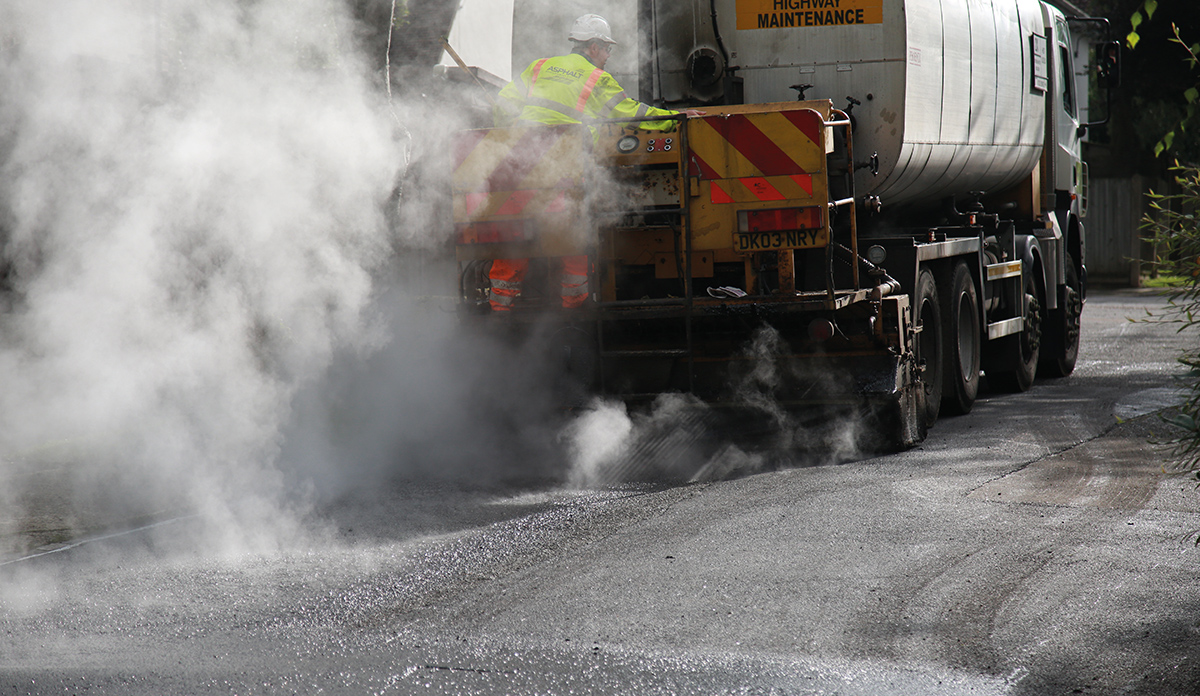Road Repairs: why you should plan next year’s road maintenance now
Find out how proactive road maintenance can reduce the need for costly and untimely road repairs!
Find out how proactive road maintenance can reduce the need for costly and untimely road repairs!
Staffordshire CC engaged with Asphalt Reinforcement Services to provide a solution to a pavement failure that had developed over a number of years. High volumes of HGV traffic on the A515 meant it was suffering badly from wheel tracking and cracks. With the aid of ARCDESO® technology, Asphalt Reinforcement Services provided a long-lasting solution that helped reduce cost and reactive maintenance – GlasGrid® CompoGrid CG100.
How surface dressing quality standards can help highways authorities deliver improved asset management.
By Howard Cooke
There’s no doubt that the recent announcement of £1.2 billion to fund road improvements, cut congestion and improve journey times is excellent news. However, it’s important that we as an industry understand this is in the context of a growing emphasis on sound asset management in the road system.
“It is vitally important that we achieve maximum returns from the money which has been allocated for highways maintenance,” Robert Goodwill, Parliamentary Under-Secretary of State for Transport,” declared in Gearing up for efficient highway delivery and funding, the key 2014 consultation document that addresses how £5.8 billion funding for local highways maintenance up to the year 2021 will be distributed.
A £580 million incentive fund has been put in place to “reward those authorities that can demonstrate that they are repairing their roads efficiently and carrying out cost-effective improvements in line with the recommendations of the DfT-backed Highways Maintenance Efficiency Programme (HMEP)”, the NCE announced in January 2015. Similarly, Mathew Lugg from HMEP had this to say: “The ability to produce evidence of good asset management will be key to securing more of the pot.”
One effective way of demonstrating good asset management is to extend pavement life with surface dressing; in fact, it can offer an ideal solution when used at the right time and in the correct way. Surface dressing can extend the life of the carriageway for some 10–15 years: 10 years for those roads with medium-to-high traffic and up to 15 years for roads with low-to-medium traffic, according to the Road Surface Treatments Association (RSTA)/ADEPT).
However, it is important to note that surface dressing customers such as local authority engineers are now increasingly focusing on relatively recently introduced mandatory regulations designed to boost quality standards across the industry as part of their focus on maintaining their asset base.
Surface dressing treatments are regulated by harmonised Product Standard (hEN) BS EN 12271. Since 1 July 2013, contractors undertaking end-performance contracts to MCHW [6} clause 922 (Surface Dressing) have needed to obtain a CE mark for their product’s legal requirement. That said, although CE marking was a legal requirement from 1 July 2013, it was not in practice being asked for when Dr Howard Robinson reviewed the regulations in the Institute of Asphalt Technology’s IAT Yearbook back in 2014. At the time he predicted that it would probably take “another couple of years “ before highways authorities collectively started to consistently demand CE accreditation from the supply chain.

Fast forward to today and the situation has moved on significantly, with highways authorities increasingly asking for evidence of CE accreditation. This has clear benefits for customers in terms of their professionalism and ensuring that contractors are able to design, build and guarantee their work. Importantly, under the new system, customers can have far more confidence in the quality of work undertaken by suppliers, which will be designed by practitioners, built to their specification and guaranteed.
Under the new rules, companies like Asphalt Reinforcement Services have taken on the design component of the project as well as the build, effectively making us responsible for ensuring that the entire process runs smoothly and is fit for purpose. This transfers the risk from the customer to the contractor. Additionally, companies may also offer extended warranties to provide clients with additional confidence in their work. All of these initiatives are raising standards in the industry.
CE-marked products come with a Declaration of Performance based on a one-year TAIT (Type Approval Installation Trial). The process is quite time-consuming and onerous because organisations have to certify every product and each type of environment that they operate in.
Contractors must complete their one-year TAITs and operate a quality management system to BS EN ISO 9001, in order to obtain a CE mark and DoP (Declaration of Performance). In addition, they must have their Factory Production Control (FPC) system successfully audited against the requirements of the relevant hEN by a Notified Body (NB) accredited by UKAS or equivalent body.
What’s more, a TAIT is required for each type of surface dressing – such as single, racked-in and double dressing – and for different road types. Consequently, Asphalt Reinforcement Services has been through the process for the different types of surface dressing for a wide range of different road categories.
While the largest, high-productivity contractors have dealt well with the accreditation process, many smaller contractors have not found it such smooth going. “Large national contractors seem to have coped fairly well and speedily with obtaining their CE marks; however, it appears that smaller to medium-sized contractors required more help and assistance from the RSTA and their certification bodies,” Dr Robinson wrote in 2014. “It will take some time for CE marking to become embedded and become the norm,” he added.
Since then, however, specifiers have increasingly been insisting on CE accreditation as they move away from the old Clause 919 contract system. “The public procurement directive says public bodies should give priority to purchasing products that have a CE mark,” Dr Robinson points out. Consequently, those contractors not able to meet the new regulations are finding their options increasingly limited.
In general, organisations seeking to work on national highways need to undergo a highly rigorous accreditation process as part of the National Highways Sector Schemes, according to the UK government regulations dealing with motorways and major road. These are bespoke quality management systems for organisations working on the UK road network, and are based on the ISO9001:2008 standards, although they do not duplicate them.
Companies supplying services to Highways England under the Specification for Highways Works (SHW) must be certified under all the relevant schemes for the work they are carrying out. “These schemes aim to make sure that work is carried out to the highest standards of professionalism, using properly trained staff, while also placing a strong emphasis on health and safety.”
Although Asphalt Reinforcement Services is by no means one of the largest contractors we consider it to be important that we are also certified to the same standard as organisations that are significantly larger: we are proud of our NHSS13 compliance, CE mark, ISO 9001 quality compliance, and an NVQ-qualified workforce. This enables us to stand out among a pool of smaller contractors.
At Asphalt Reinforcement Services we’re seeking to keep ahead of the curve by bringing in new technology and equipment. This has proved to be a major benefit for the company, and we are now able to bid for surface dressing contracts to Clause 922 highway works as well as cycle tracks, footways and heritage work.
A good example of this innovation is our ability to further enhance carriageway life by using a non-woven geosynthetic interlayer. This is laid on the road surface ahead of the surface dressing process and forms a retention and regulating layer for the bitumen so that the chip can be embedded with good adhesion.
The use of paving fabrics can extend the life of surface dressing by an additional 50 to 75% in warmer climates, which we are starting to experience in the UK. There are a number of additional benefits such as suppressing reflection cracks (the SAMI effect); this system also helps to prevent bleeding and contributes to providing an impermeable layer, so protecting the lower pavement.
Asphalt Reinforcement Services uniquely has the expertise to offer a fully integrated service by installing both this paving fabric interlayer and the surface dressing.
We also recognise that surface dressing can be a real inconvenience to motorists and residents, and we aim to put their needs first. We train our staff to recognise the importance of making sure members of the public are respected. For instance, when we’re working within housing estates we can offer a very personal service in terms of the way we deal with members of the public. This approach seems to be working well for us.
A recent project at the Silverstone grand prix circuit is a good example of our approach. Although the resurfacing was due to take place over the weekend – which in itself was a tight schedule – the work was rained off on the Saturday. Consequently, we raced through the work on the Sunday to complete it on time for the event, and received numerous plaudits for the quality of the job delivered. Quality standards are the key to success in this industry.
Howard Cooke is managing director of Asphalt Reinforcement Services and the incoming chairman of the Road Surface Treatments Association.
Asphalt Reinforcement Services received a Green Apple Award at the Houses of Parliament for their role in the Cambridgeshire ‘Regen Roads’ Programme. The Green Apple Environment Awards recognise, reward and promote environmental best practices around the world.
Read More »Asphalt Reinforcement Wins Environmental Best Practise Award

Asphalt Preservation Services is an important new addition to the Asphalt Group Holdings portfolio. As part of the Group’s continuous journey to provide excellence to our customers we are aiming to extend our current ISO 9001;2015 accreditation for Quality to the Triple ISO Certification which includes ISO 14001 Environmental Management and ISO 45001 Occupational Health and Safety Management.

Asphalt Preservation Services are proud to announce that all members of our installation teams now carry Highways England Passports for Health and Safety .
The Highways England Passport Scheme was introduced as part of Highways England’s 5-year Health and Safety Plan. Its purpose is to set a common safety standard to help validate and maintain the standards of the more than 50 thousand workers on the highway network and to ensure they’re well being.
‘Our staff have passed the Common Induction Training and each member of our installation team now carries a smartcard with their training record, qualifications and competency details making it much more straightforward to gain access to the Highways England sites we are working on’ says Howard Cooke, Asphalt Preservation Services Managing Director.
The Highways England Passport smartcard is read using the passport app, which is available on Android and iOS or on a PC-connected desktop reader and can be easily maintained to make sure the information on the card is up-to-date and can be relied upon. The smart card will provide a one card system which will make things a lot easier and more efficient improving several factors such as entry times to sites, verifying credentials and management of risks concerning employee fatigue.
‘This is a win-win scheme for both our customers and our staff. Our customers can feel confident that our installation teams are properly trained, qualified and have the competencies to work on any site. And our staff will be safer and save time as they move between sites as they won’t have to repeat all elements of the safety induction each time they start on a new job’ concludes Cooke.
The Health and Safety Passport Scheme and its smartcard will make work ‘Safer, Smarter and Simpler.’
Just as our skin is damaged and aged by exposure without protection to the sun’s UV radiation, so too is your road network. And just like with our skin, damage to the asphalt can be avoided with the proper protection.
ONE APPLICATION PROTECTS AGAINST SUN + RAIN, SNOW & CRACKS. AND DOUBLES THE LIFE OF YOUR ASPHALT!
A single application of Asphalt Preservation protects your asphalt asset against degradation and potholes by preventing the damaging effects of sunlight, weathering, water ingress and salt applications for 5-years. Further applications continue this protection and can keep on extending your asphalt pavement life.
As the essential material for the UK road network’s expansion and maintenance, asphalt is integral to improve transportation and support sustainable development. However, the pollution and levels of waste generated by the asphalt paving industry can pose a significant threat to the environment.
With environmental, social and corporate governance values, also known as ESG values, the asphalt paving industry has an opportunity to step up and keep pace with the sustainability guidelines. Changes to the cultural and regulatory landscape have accelerated the progress of the ESG agenda, but at Asphalt Group, sustainability has always been at the core of what we do and the reasoning behind our premium asphalt solutions.

In its simplest form, ESG is an instrument for evaluating companies on how far advanced they are with sustainability in its broadest sense, covering environmental, social and governance factors.
Environmental factors include the contribution a company makes to climate change through greenhouse gas emissions, along with waste management and energy efficiency — themes pertinent to the asphalt paving sector.
Social factors include human rights, labour standards in the supply chain, and workplace health and safety. We know that health and safety is something our sector has championed for many years.
The final component is governance, which refers to a set of rules or principles defining rights, responsibilities and expectations between different stakeholders in the governance of corporations to balance the expectations of employers and employees.
Instilling environmental, social and governance strategies is now essential for contractors and suppliers who wish to trade ethically. We at Asphalt Group have committed to building a long-term ESG policy and to delivering a sustainable organisation through our commitment to accredited work (we are Triple ISO-accredited) and the unique long-lasting nature of our asphalt solutions.
Asphalt Group truly believe that our sector has an opportunity to take a leadership role in sustainable practices by embracing ESG holistically and proactively. Government regulations and sustainability goals set the precedent for how asphalt suppliers and contractors work on the UK’s road network. However, if we as a sector can adopt ESG values ahead of regulatory milestones, in every aspect of business from carbon reduction to ethical employment practices, we will be doing the best for ourselves and our planet. Furthermore, from a business angle, consumer behaviour is now geared towards making sustainable choices and those who are slow to adopt ESG values into their business will soon start to see they fall behind.
Over recent decades, there has rightly been a significant focus on sustainability, achieved through a fully embedded circular economy approach. Our goal is to be the most sustainable road asset management company in the UK and help local authorities to meet CO2 reduction targets by 2050. The Asphalt Group are working towards a carbon-neutral fleet of asphalting vehicles and our production process has already achieved a significant reduction in emissions. Our premium solutions – including, Reinforcement, Surface Dressing and Preservation – simply help road assets to last much longer and cut down the requirement for replacement and maintenance. This obviously offers economic benefit to our clients, but most importantly cuts down carbon emissions.
Sustainability is only a single pillar of the ESG umbrella, however. At Asphalt Group, we see the importance of ESG relating to many areas such as diversity, inclusion, honesty and integrity, at every level of our organisation. Only by taking a holistic approach can we truly stand by our ESG credentials and pave the way to a sustainable future.
Read More »ESG and why it matters for the asphalt paving industry
At Asphalt Group, the pavement performance specialists, we have bolstered our team with the appointment of a new Specification Engineer. With his experience, expertise and knowledge of our specialist asphalting solutions, Adrian Smith joins the team this month to continue forging strong relationships with our valued clients.
Read More »Asphalt Group appoints new specification Engineer